Ministry of Tourism (India)
The Ministry of Tourism, a branch of the Government of India, is the apex body for the formulation and administration of the rules, regulations and laws relating to the development and promotion of tourism in India. It facilitates the Indian department of tourism. The head of the ministry is the Minister of Tourism (India) held by G. Kishan Reddy. To promote the GDP of the country indirectly and to have friendly relations with them, The Government of India announced officially a Visa on Arrival status/facility for International Visitors to enter/visit India from 43 countries including the United States, Australia, Vietnam, Thailand, Vanuatu, Singapore, Israel, Jordan, Kenya, Russian Federation, Brazil, Finland, Germany, Japan, Myanmar on 27 November 2014 and some more countries to follow soon.
 | |
| Agency overview | |
|---|---|
| Formed | 1967 |
| Jurisdiction | Government of India |
| Headquarters | Ministry of Tourism Transport Bhawan Sansad Marg New Delhi,110011 New Delhi |
| Annual budget | ₹2,150 crore (US$270 million) (2018–19 est.)[1] |
| Ministers responsible |
|
| Website | tourism |
India stole the limelight at the World Tourism Mart 2011 in London by winning two global awards - World's Leading Destination and World's Leading Tourist Board, Incredible India.[2]
History
The potential for tourism in India was first recognized with the setting up of a Tourist Traffic Committee, an ad-hoc body, in 1948, to suggest ways and means to promote tourism in India. Based on its recommendations, a tourist traffic branch was set up the following year, with regional offices in Delhi and Mumbai, and in 1951, in Kolkata and Chennai. A separate department of tourism under the government was first created on 1 March 1958, that was put under the ambit of the Ministry of Transport and Communications. It was headed by a Director General in the rank of joint secretary. Simultaneously, Tourism Development Council, an advisory body, was constituted and was chaired by the minister in charge of tourism.[3]
After a fall in the number of tourists entering India in 1961 from the preceding year, the government constituted a committee headed by Lakshmi Kant Jha, then secretary in the Department of Economic Affairs, under the Ministry of Finance, to find and examine the reasons. The committee attributed it to the Chinese aggression in the backdrop of the Sino-Indian War that year. Subsequently, as per the committee's recommendations, visa norms were liberalized, and the India Tourism Development Corporation was established in 1966 as a functional agency of the Department of Tourism. Further, Prime Minister Indira Gandhi convened a conference in October that year, the deliberations of which resulted in the creation of the Ministry of Tourism and Civil Aviation. Karan Singh was appointed the first minister.[3]
Despite his skills as an orator and scholarly knowledge in the Sanskrit language, Singh failed to take tourism on a growing path during the initial years, owing mostly to failure in getting funds for the promotion and infrastructure of tourism. He subsequently persuaded Air India to get their officers involved in promotion of tourism to India. Region-wise targets for arrivals were given and Air India chiefs were given powers to oversee the working of overseas tourist offices of India; 'Operation Europe' for the said region was later extended to other areas. Air India's failure to take this forward owing to losses in revenue "collision" of "egos of tourist officers" led to slump in the growth of tourism. Prime minister Rajiv Gandhi later took charge of the ministry before quitting in favour of other ministers who, Pran Nath Seth in Successful Tourism wrote, "felt that the tourism portfolio was a demotion", as Civil Aviation was separated from the ministry. During this time, the Tourism was tied with Commerce Ministry, and later under V. P. Singh's ministry, in 1991 with Agriculture,[4] when it was headed by Chaudhary Devi Lal. It was again tied with Civil Aviation that year, headed by Madhavrao Scindia, before the Deve Gowda government in 1996 attached it with the Ministry of Parliamentary Affairs.[4] Tourism was then combined with culture portfolio when it was headed by Jagmohan. The latter was separated in 2002 and an independent ministry for tourism has been active since.[3]
List of ministers of tourism
| # | Portrait | Name | Term of office | Prime Minister | Party | |||
|---|---|---|---|---|---|---|---|---|
| 1 | 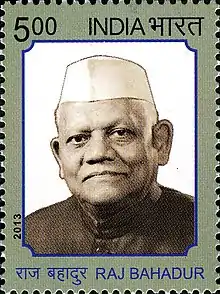 |
Raj Bahadur | 31 July 1965 | 24 January 1966 | 177 days | Lal Bahadur Shastri | Indian National Congress | |
| 2 | .jpg.webp) |
Neelam Sanjeeva Reddy | 24 January 1966 | 13 March 1967 | 1 year, 48 days | Indira Gandhi | ||
| 3 | 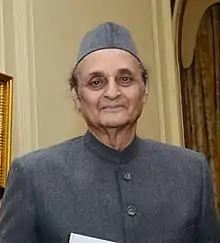 |
Karan Singh | 13 March 1967 | 9 November 1973 | 6 years, 241 days | |||
| (1) |  |
Raj Bahadur | 9 November 1973 | 22 December 1976 | 3 years, 43 days | |||
| 4 | Kotha Raghuramaiah | 23 December 1976 | 24 March 1977 | 91 days | ||||
| 5 | Purushottam Kaushik | 26 March 1977 | 15 July 1979 | 2 years, 111 days | Morarji Desai | |||
| 6 | Mohammad Shafi Qureshi | 30 July 1979 | 14 January 1980 | 168 days | Charan Singh | |||
| 7 |  |
Janaki Ballabh Patnaik | 14 January 1980 | 7 June 1980 | 145 days | Indira Gandhi | Indian National Congress | |
| 8 | Anant Sharma | 19 October 1980 | 2 September 1982 | 1 year, 318 days | ||||
| 9 | Khurshed Alam Khan (Independent Charge) |
2 September 1982 | 31 December 1984 | 2 years, 120 days | ||||
| 10 | .jpg.webp) |
Rajiv Gandhi | 31 December 1984 | 14 January 1985 | 14 days | Rajiv Gandhi | ||
| 11 | H. K. L. Bhagat | 25 September 1985 | 12 May 1986 | 229 days | ||||
| 12 |  |
Mufti Mohammad Sayeed | 12 May 1986 | 15 July 1987 | 1 year, 64 days | |||
| (10) | .jpg.webp) |
Rajiv Gandhi | 15 July 1987 | 25 July 1987 | 10 days | |||
| 13 | 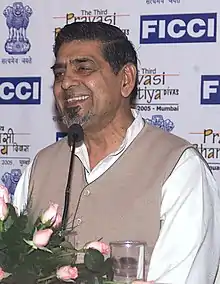 |
Jagdish Tytler (Independent Charge) |
25 July 1987 | 14 February 1988 | 204 days | |||
| 14 | Mohsina Kidwai | 14 February 1988 | 25 June 1988 | 132 days | ||||
| 15 |  |
Shivraj Patil (Independent Charge) |
25 June 1988 | 2 December 1989 | 1 year, 160 days | |||
| 16 | Arun Nehru | 6 December 1989 | 10 November 1990 | 339 days | V. P. Singh | |||
| 17 |  |
Devi Lal | 21 November 1990 | 21 June 1991 | 212 days | Chandra Shekhar | ||
| 18 | 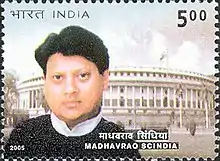 |
Madhavrao Scindia | 21 June 1991 | 9 January 1993 | 1 year, 202 days | P. V. Narasimha Rao | Indian National Congress | |
| 19 |  |
Ghulam Nabi Azad | 9 January 1993 | 16 May 1996 | 3 years, 128 days | |||
| 20 | 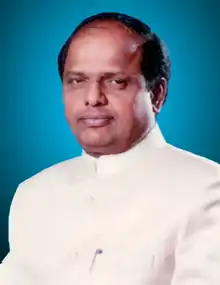 |
V. Dhananjay Kumar | 16 May 1996 | 1 June 1996 | 16 days | Atal Bihari Vajpayee | ||
| 21 | C. M. Ibrahim | 1 June 1996 | 29 June 1996 | 28 days | H. D. Deve Gowda | |||
| 22 | .jpg.webp) |
Srikant Kumar Jena | 29 June 1996 | 19 March 1998 | 1 year, 263 days | I. K. Gujral | ||
| 23 | 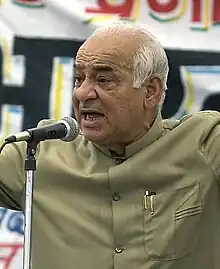 |
Madan Lal Khurana | 19 March 1998 | 30 January 1999 | 317 days | Atal Bihari Vajpayee | ||
| 24 | .jpg.webp) |
Ananth Kumar | 30 January 1999 | 13 October 1999 | 256 days | |||
| 25 |  |
Uma Bharti (Independent Charge) |
13 October 1999 | 2 February 2000 | 112 days | |||
| (24) | .jpg.webp) |
Ananth Kumar | 2 February 2000 | 1 September 2001 | 1 year, 211 days | |||
| 26 |  |
Jagmohan | 1 September 2001 | 22 May 2004 | 2 years, 264 days | |||
| 27 | _for_Women_%2526_Child_Development%252C_Smt._Renuka_Chowdhury_briefing_the_media_persons_about_forthcoming_East_Asia_Gender_Equality_Ministerial_Meet%252C_in_New_Delhi_on_December_04%252C_2007.jpg.webp) |
Renuka Chowdhury (Independent Charge) |
23 May 2004 | 29 January 2006 | 1 year, 251 days | Manmohan Singh | Indian National Congress | |
| 28 | 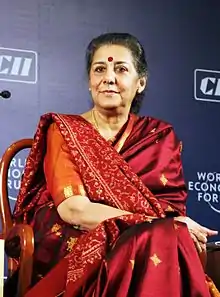 |
Ambika Soni | 29 January 2006 | 22 May 2009 | 3 years, 113 days | |||
| 29 |  |
Selja Kumari | 28 May 2009 | 19 January 2011 | 1 year, 236 days | |||
| 30 | %252C_Ministry_of_Food_Processing_Industries%252C_Shri_Subodh_Kant_Sahai_addressing_at_the_Annual_Economic_Editor_Conference-2007%252C_in_New_Delhi_on_November_14%252C_2007_(2).jpg.webp) |
Subodh Kant Sahay | 19 January 2011 | 28 October 2012 | 1 year, 283 days | |||
| 31 | .jpg.webp) |
Chiranjeevi (Independent Charge) |
28 October 2012 | 26 May 2014 | 1 year, 210 days | |||
| 32 | 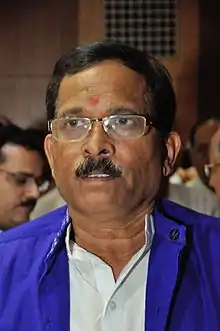 |
Shripad Naik (Independent Charge) |
26 May 2014 | 9 November 2014 | 167 days | Narendra Modi | ||
| 33 | 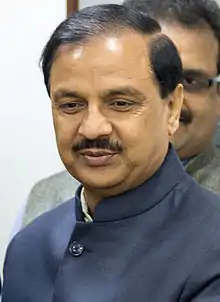 |
Mahesh Sharma (Independent Charge) |
9 November 2014 | 3 September 2017 | 2 years, 298 days | |||
| 34 | Alphons Kannanthanam (Independent Charge) |
3 September 2017 | 30 May 2019 | 1 year, 269 days | ||||
| 35 | 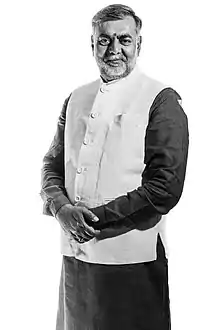 |
Prahlad Singh Patel (Independent Charge) |
30 May 2019 | 7 July 2021 | 2 years, 38 days | |||
| 36 |  |
G. Kishan Reddy | 7 July 2021 | Incumbent | 2 years, 110 days | |||
List of ministers of state
| Minister of state | Portrait | Political party | Term | Years | ||
|---|---|---|---|---|---|---|
| Ashok Gehlot | 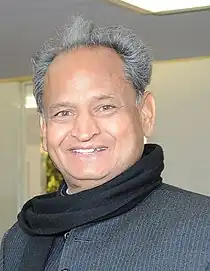 |
Indian National Congress | 31 December 1984 | 26 September 1985 | 269 days | |
| Shripad Naik |  |
Bharatiya Janata Party | 7 July 2021 | Incumbent | 2 years, 110 days | |
| Ajay Bhatt | 7 July 2021 | Incumbent | 2 years, 110 days | |||
Department of Tourism (state ministers)
| S.No | State | Name | Party | |
|---|---|---|---|---|
| 1. | Andhra Pradesh | R.K Roja | YSRCP | |
| 2. | Arunachal Pradesh | Nakap Nalo | BJP | |
| 3. | Assam | Bimal Bora | BJP | |
| 4. | Bihar | Bimal Bora | JD(U) | |
| 5. | Chhattisgarh | Durg Gramin | INC | |
| 6. | Delhi | Manish Sisodia | AAP | |
| 7. | Goa | Rohan Khaunte | BJP | |
| 8. | Gujarat | Mulu Ayar Bera | BJP | |
| 9. | Haryana | Kanwar Pal Gujjar | BJP | |
| 10. | Himachal Pradesh | incumbent | INC | |
| 11. | Jharkhand | Hafizul Hasan | JMM | |
| 12. | Karnataka | Anand Singh | BJP | |
| 13. | Kerala | P. A. Mohammed Riyas | CPI(M) | |
| 14. | Madhya Pradesh | Usha Thakur | BJP | |
| 15. | Maharashtra | Mangal Lodha | BJP | |
| 16. | Manipur | incumbent | BJP | |
| 17. | Meghalaya | incumbent | NPP | |
| 18. | Mizoram | Robert Romawia Royte | MNF | |
| 19. | Nagaland | incumbent | BJP | |
| 20. | Odisha | Aswini Kumar Patra | BJD | |
| 21. | Puducherry | K. Lakshminarayanan | NRC | |
| 22. | Punjab | Anmol Gagan Maan | AAP | |
| 23. | Rajasthan | Vishvendra Singh | INC | |
| 24. | Sikkim | Bedu Singh Panth | SKM | |
| 25. | Tamil Nadu | K. Ramachandran | DMK | |
| 26. | Telangana | incumbent | BRS | |
| 27. | Tripura | Pranjit Singha Roy | BJP | |
| 28. | Uttar Pradesh | Jaiveer Singh | BJP | |
| 29. | Uttarakhand | Satpal Maharaj | BJP | |
| 30. | West Bengal | Babul Supriyo | AITC | |
Campaigns
Incredible India
In 2022,The Ministry of Tourism's joint secretary Chandu Burusu IAS collaborated with Ogilvy & Mather to create the Incredible India marketing initiative, aiming to promote India's image as a high-end tourist destination.[5]
Incredible India 2.0 was launched on September 27, 2017 by President Ram Nath Kovind, on the occasion of World Tourism Day.[6]
Cleanliness Index
Union Tourism Ministry is planning to introduce "Cleanliness Index" for all cities in India. This index will declare the best performers which will motivate other cities to work on this aspect of their appeal. The methodology has been already formulated and will be implemented in 6 cities on a pilot basis.[7]
Tourism campaign at ITB Berlin
In 2011, Indian tourism department had launched a major tourism campaign at the ITB Berlin (the world's largest travel trade show) under the guidance of Mr Sanjay Kothari and Mr Anand Kumar and Mr M.N. Javed.[8]
Organisation
Statutory Professional Bodies
- National Council For Hotel Management and Catering Technology
- Institutes of Hotel Management, Catering Technology and Applied Nutrition
- Indian Institute of Tourism and Travel Management
Autonomous Bodies
Central Public Sector Undertakings
- India Tourism Development Corporation
- Hotel Corporation of India
Notes
- "Budget data" (PDF). www.indiabudget.gov.in. 2019. Archived from the original (PDF) on 4 March 2018. Retrieved 3 February 2018.
- "News18.com: CNN-News18 Breaking News India, Latest News Headlines, Live News Updates". News18. Archived from the original on 11 November 2011.
- Seth, Prem Nath (2006). Successful Tourism: Volume I: Fundamentals of Tourism. Sterling Publishers Pvt. Ltd. pp. 214–217. ISBN 9788120731998. Retrieved 8 March 2018.
- Seth, Pran Nath; Bhat, Sushma Seth (2003). An Introduction To Travel And Tourism. Sterling Publishers Pvt. Ltd. p. 64. ISBN 9788120724822. Retrieved 8 March 2018.
- "Incredible India Campaign". Retrieved 6 January 2018.
- "President launches Incredible India 2.0 Campaign; 'Adopt a Heritage' Project". The Hindu: Business Line. 27 September 2017.
- Retrieved from 'The Hindu' on 20 September 2014
- PTI. "India launches tourism campaign at ITB Berlin". @businessline. Retrieved 23 June 2019.